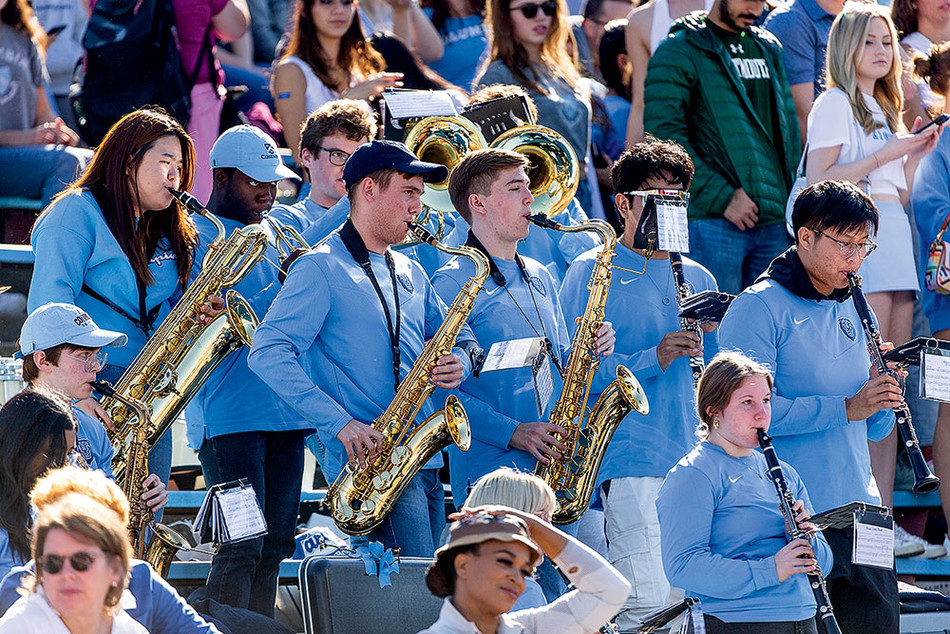Brent Morden ’19CC had four weeks to prepare for Homecoming: four rehearsals in a room in Riverside Church, where the brand-new Columbia Athletics spirit band converged on Sunday evenings with their horns and drums, and where Morden, the band director, had to get two dozen students who had never played together to blend like a passable Bordeaux. He tried out different songs to see what clicked and polished up Columbia anthems like “Roar, Lion, Roar” and “Who Owns New York?”
The previous marching band, known for its anarchic, irreverent, hit-or-miss approach to the band arts, had been barred from football games in 2019, after failing to either take the steps to become a recognized student group or agree to work under the auspices of Columbia Athletics. Then, in 2020, amid allegations of off-field misbehavior, the band voted to dissolve itself (some hoped it was just another bit of satire; it wasn’t). According to Samantha Rowan ’96BC, president of the Columbia University Band Alumni Association, many members were shocked by the news and did not recognize their own experiences in the accounts of racism and sexism that had surfaced in the press.
Both Rowan and the University wanted a fresh start, and during the COVID-19 lockdown Rowan spoke with Peter Pilling, director of Columbia Athletics, and Mike Miller, associate athletics director for marketing, ticketing, and fan engagement, as well as alumni, about “forming a group that more reflected the organization that most of us remembered,” she says.
Whereas the old band was run by students and featured nontraditional instruments such as toilet seats and “wet floor” signs, the new band joins the dance and cheer teams as a Columbia “spirit group.” Today the accent is on musical skill over wacky on-field antics. Says Miller, “We’re focusing on musicianship, because over the years, talented people in different musical groups on campus didn’t want to play in that band because it didn’t seem like a serious musical-performance group.”
Cue Brent Morden. A music major at Columbia, Morden played euphonium in the wind ensemble, for which he composed, conducted, and served as president. He was also musical director of Uptown Vocal, the student jazz a cappella group, and in his senior year he was one of the composers and lyricists for the 125th Varsity Show. Though he has never conducted a pep band, he is excited, he says, to “expand my palette” and build a band from the ground up. “We welcome every student musician who wants to play with us and represent Columbia,” he says.
At the Homecoming game against Dartmouth, Kraft Field at Wien Stadium was packed with more than ten thousand Lions fans, many in blue and white. And there in the stands, around the thirty-yard line, twenty people dressed in matching Columbia-blue jerseys held saxophones, clarinets, drums, a tuba. Morden, stationed in the bottom row wearing sunglasses, with a yellow whistle lodged in his lips, looked from the field to the musicians, getting a feel for the flow of the game and when to strike up the band. Then he raised his hand and counted off: fans heard CU standards, snippets of classic pop songs (“The Final Countdown,” “Eye of the Tiger”), and sly quotations from Mozart and Beethoven (mellower high jinks than sis-boom-bah-ing through Butler Library on the eve of exams). Many fans appreciated this wink at Music Hum, though some felt the theme from Eine kleine Nachtmusik was not the ideal soundtrack for the simulation of war that was football. “The repertoire is still in progress,” Morden says. “One of my jobs is to curate music that the band enjoys playing and that fits with the action of the game and gets the crowd excited. It’s almost like doing a film score.”
As for the game score, the Lions lost a heartbreaker in the final seconds, 27–24.
Afterward, more students reached out to join the band. There are now upwards of thirty members, and Morden would like to hit forty by the end of the school year. The band will play at men’s and women’s home basketball games throughout the spring, and next football season, if all goes well, they could take to the field and line up in a respectable halftime formation.
This article appears in the Winter 2022-23 print edition of Columbia Magazine with the title "Marching to a Different Beat."



